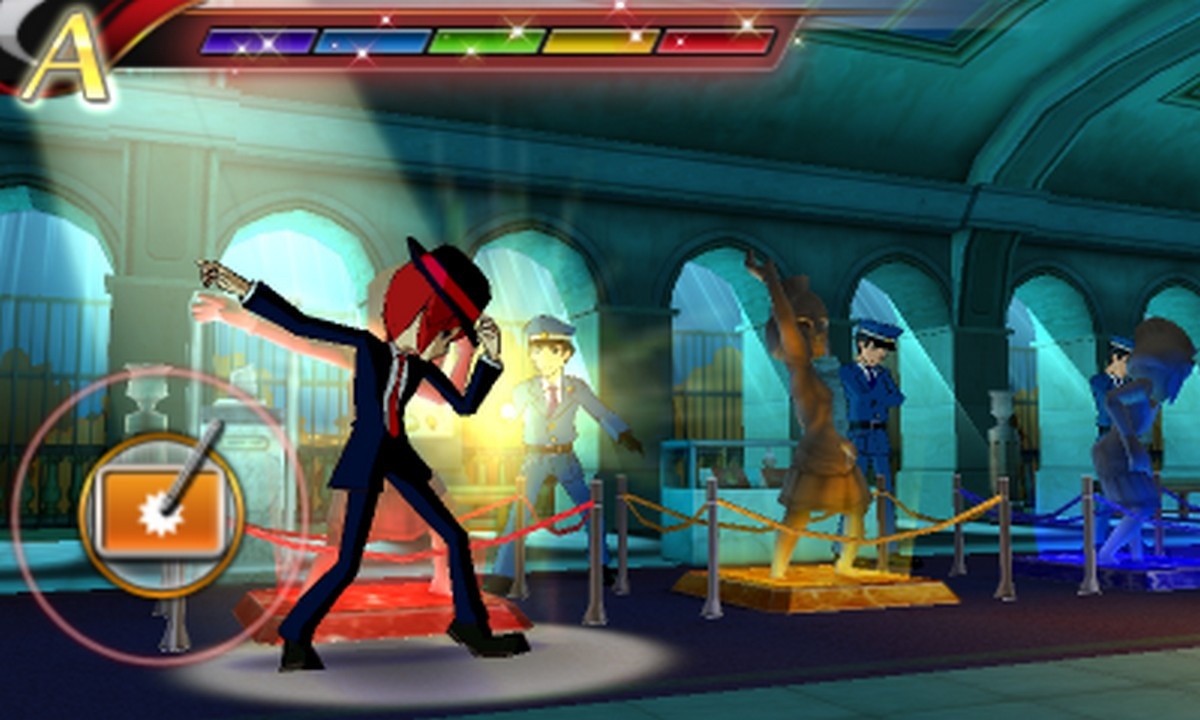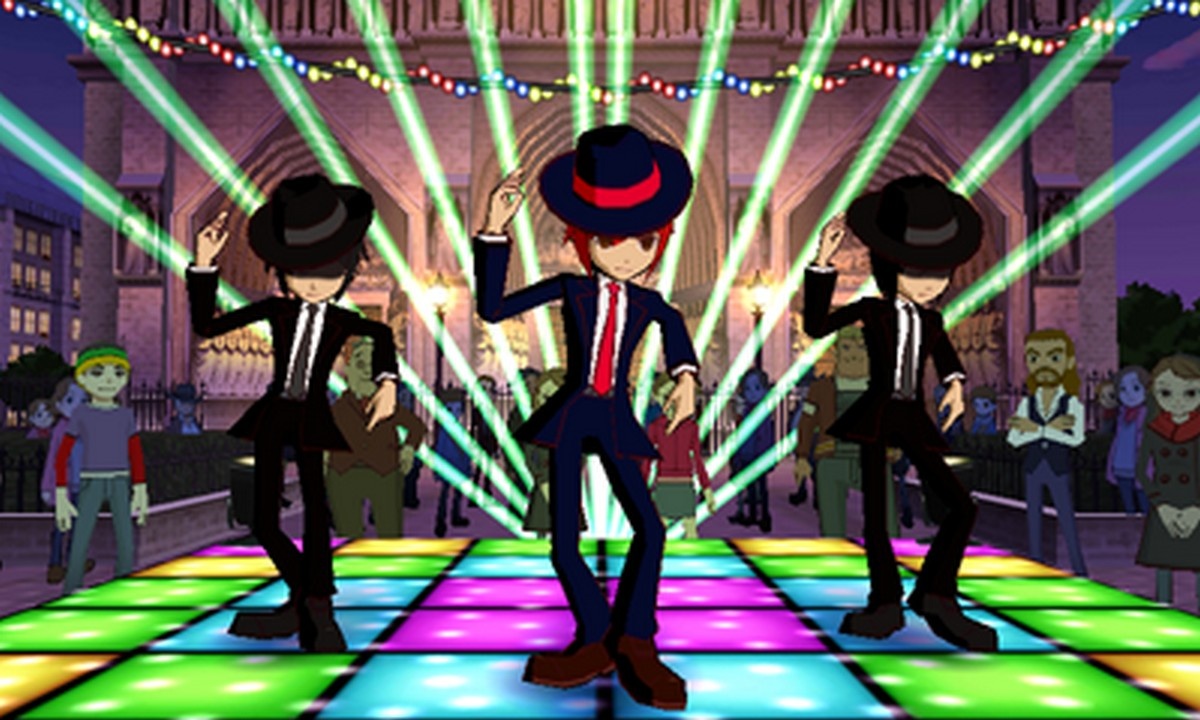UK REVIEW--It has long been a theory that anything can be improved with choreographed dance routines. The people at Sega are champions of this cause. Space Channel 5, Michael Jackson's Moonwalker, and even Bayonetta manage to get in on the action. Rhythm Thief & The Emperor's Treasure, Sega’s latest foray into the world of funk, is an immensely fun musical adventure around the streets of Paris, mixing various rhythm-action minigames with some light point-and-click adventuring.
The game opens in true flamboyant Broadway style as hero Phantom R greets you with a dance-off. After a brief introduction, you're instantly tapping, swiping, and circling the touch screen in time to a troupe of dancers on the upper screen. Single-screen instructions appear before this (and every) minigame, removing any barrier to getting started. It's hard not to fall in love with a game that begins with you strutting your stuff atop the Arc de Triomphe.
Then the story gets going. Phantom R, real name Raphael, is Paris' most wanted thief. With cops hot on his trail, he breaks into art galleries and museums, stealing their priceless treasures and generally making a fool of Paris' most highly strung detective. He warns the law first, of course. Phantom R is all all about spectacle. After all, you can't have a dance-off without an audience. It soon becomes clear that there's a little more to Phantom R's behavior than just plain villainy, however. Aided by his dog Fondue and mysterious violinist Marie, Phantom R sets about uncovering a citywide conspiracy and foiling the plan of the recently resurrected Napoleon Bonaparte.
It's all very silly and over the top, and this gels perfectly with the style of the numerous minigames on offer. You won't just be swiping in dance-offs. There's plenty of variety, from rhythmically sneaking behind statues and tapping the corresponding colored button to the beat, to cooking broccoli and steak in time to music. There are platforming segments, as if Cameo met Canabalt, where you tap the face buttons to spring from highlighted spots. There are minigames that use the 3DS's gyro controls (and the game has the sense to disable the 3D effects during these), a few games, which would be a shame to detail in advance, are even based on existing Sega IPs. Then there's the wonderful series of violin minigames--laid out like Guitar Hero--that see you swiping the stylus back and forth in time with Marie's bowing.
Most of the minigame types are repeated, but the rhythms and forms they take are different to the point that the reuse of gametypes is never unwelcome. The music is wonderful; it's a mixture of original pieces and new arrangements of classical tunes. Action plays out on the top screen, and you have audio cues, the characters' own actions, and an optional button guide to aid your timing. None of the games are challenging enough to become frustrating, although you can purchase power-ups before each minigame that either speed your performance meter's increase or slow its decrease. If you're finding things too easy, there's also an optional feature that requires you to perfect the minigame before you can proceed.
The main flaw with the minigames is the way the scoring works. Your performance meter increases or decreases based on hitting the beats correctly. However, the speed at which this happens is so great that a few correct notes or a few incorrect notes can send you from E to A or vice versa. It's entirely possible to hit every note perfectly, miss too many at the end, and then fail. However, the games are so much fun, and the controls so responsive and accurate, that even when you do have to repeat one or two, it's never frustrating. Outside of the game, you can replay any of the minigames to improve your score, which is broken down into perfect, great, good, and harsh (missed) notes.
Rhythm Thief doesn't just funnel from one minigame to the next, though. The majority of the game takes place on the streets of Paris, and navigating is almost identical to the way you explore in the Professor Layton games. On the top screen is a map, and on the bottom is a 2D screen showing the current area you're in. There's a lot to do around Paris beyond dancing. Talking to non-player characters occasionally gives you the opportunity to take on bonus challenges, and tapping around can produce medals, which are used to purchase in-game cutscenes you've already viewed or the aforementioned power-ups. There are also two major side quests in the game. The first, Phantom Notes, requires you to piece together scraps of a musical score by finding notes hidden within an area. The second, Master Instrument, has you recording sounds from the environment and playing them back to a shopkeeper so he can construct the ultimate musical instrument.
The sound recording mechanic comes into play during the main storyline too, because you often need to rouse NPCs by playing the correct sound. These puzzles are never difficult, but they often involve amusing scenarios such as finding a chicken, recording its cluck, then using it to wake a sleeping professor. There are also brief timing-based puzzles, which usually revolve around unlocking something and have you tapping a button in time to the beat. These are certainly nothing remotely challenging, but they're entertaining nonetheless.
Perhaps the biggest downside in this adventure is the amount of to-ing and fro-ing during the exploration sections. Often you find yourself running back and forth across Paris in pursuit of a bit of information or another character, but Rhythm Thief spaces out the minigames too much. Traversing the city is easy and painless, but it often feels as if Sega artificially extended the length of the game. Too often you reach your goal only to be told to go somewhere else, then somewhere else, with nothing much to break that up. Running around is easy enough, but it’s not necessary.
Unlike Professor Layton and its ilk, Rhythm Thief doesn't throw challenges at you that frequently (there are 50 full minigames in total, including the bonus ones), but it manages to have enough diverse content that it doesn’t become repetitious. Outside of the story, there's Marathon mode, which lets you play certain game types until you fail, and StreetPass functionality lets you test your skill against minigame times set by passersby, with the winner obtaining a new NPC for his or her city.
There's a lot to love about Rhythm Thief & The Emperor's Treasure. The occasional plodding sections do little to stop the game from being an endearing, joyful experience. Beautiful 2D cutscenes and some great 3D effects make this a visual treat as well. Phantom R struts around Paris with style like Layton and moves like Jagger, and it's impossible not to be won over by this glorious mixture of music, mystery, and excellent rhythm action.
'
